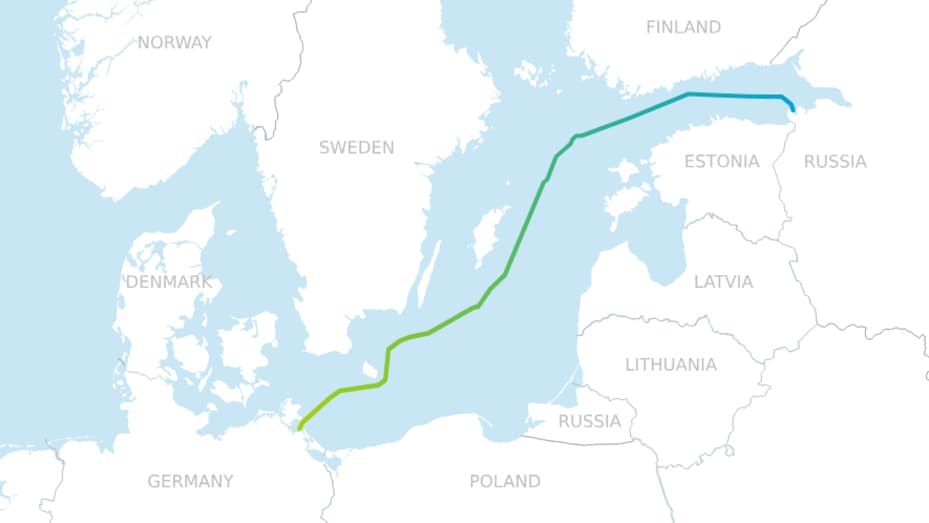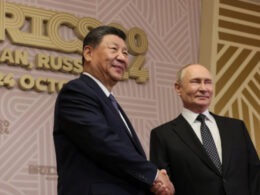
Discover Top American-Made Products!
Support local craftsmanship with these high-quality, American-made items—shop now on Amazon!
Shop NowIn a truly unexpected move from a European power that has appeared timid, even cowed, and unwilling to act against Russian aggression against Ukraine, Germany has stepped in. Surprisingly, Berlin slammed the certification door shut on the Nord Stream 2 gas pipeline that was set to bring natural gas directly from Russia to North Germany beneath the Baltic Sea, and even more astonishingly with NATO allies, Germany is mobilizing 14,000 troops of the NATO Response Force to a minimum of 30 days deployment notice and calls to increase the Defense budget of the Central European powerhouse by €37.6 billion. This is easily the most massive mobilization of German forces and ramp-up of military spending seen in Germany since the Second World War. Meanwhile, Joe Biden announced meaningless sanctions targeted to prevent American businesses from trading in Donetsk and Luhansk.
Germany. Europe’s Reluctant Military Powerhouse
According to NBC, German Chancellor Olaf Scholz, told the press that Germany would not accept the recognition of the two self-proclaimed, Moscow-backed separatist regions in the Donbas region of eastern Ukraine and that Germany has to reassess the situation of the Nord Stream 2 pipeline.
 “In light of the most recent developments we must reassess the situation in particular regarding Nord Stream 2,” Scholz said at a news conference.
“In light of the most recent developments we must reassess the situation in particular regarding Nord Stream 2,” Scholz said at a news conference.
“Scholz said he’d asked the German Economy Ministry to take steps “to make sure that this pipeline cannot be certified at this point in time, and without this certification Nord Stream 2 cannot operate.”
“The appropriate departments of the Economy Ministry will make a new assessment of the security of our supply in light of what has changed in last few days,” he added.
Forbes wrote that the chancellor told anxious Germans, “…where gas is being used, we will switch to hydrogen. This will be a process that will happen faster than many might imagine today, and that will create a bright future for all of us.”
While belated, it appears that the German people are finally taking the threat of an expansionist Russia seriously. The Chancellor posted a series of Tweets on February 23rd,
“I feel like many citizens in Germany: we are all concerned that peace in Europe is threatened. We must not be naive. But we will continue to try everything to get #Russland to leave this path again.”
He continued, “The situation is serious. The peace order in Europe is based on the fact that borders are not changed. We must return to these principles: State sovereignty is respected. Boundaries are not shifted.”
“We must back up our promises with actions and act consistently with our friends. The violation of international law #Russland |s will lead to sanctions, which will be significantly expanded in the case of a military invasion throughout #Ukraine.
The scars of WWII run deep in Germany, as does the collective responsibility of a nation once caught in the madness of militarized radicalism. So it’s no wonder the German people are slow to reach for their rifles in the post-war world, which makes the fact that they are doing so now in a very, very big way… all the more meaningful. And for Moscow, it should be all the more frightening because this is a massive 21st-century German military force of over 180.000 active personnel with another 30k in reserve, with British, French, and American support and the finest technology and arms that money can buy.

ArmyRecognition and WSSW reported,
“Defense Minister Christine Lambrecht (Social Democrats, SPD) on February 18 called for a rapid and massive increase in defense spending to prepare the German armed forces for a possible war against Russia. “The threatening situation on the borders of Ukraine has once again shown us very clearly how important an effective deterrent is unfortunately again today,” she explained to Der Spiegel. From this, Germany’s governing coalition must draw conclusions “for the financing of the German army.”
Lambrecht went on to explain that national and allied defense within NATO is one of the core tasks of the German armed forces or Bundeswehr, a unified command of their land, sea, and air forces. “They have to be equipped in the best possible way for this, and that also means that the defense budget must continue to increase,” she said.
The spending figures being discussed behind the scenes are astonishing given Germany’s typical post-war hesitancy toward militarization: German publication Der Spiegel revealed that planners for the armed forces have calculated that the military will need to spend an additional €37.6 billion between now and 2026. This massive uptick in spending will allow the Germans “to fulfill commitments already made to NATO and to be able to implement urgently needed modernization steps, such as the purchase of a new fleet of fighter jets.”
 Lambrecht told DieWelt Politics, “We in Germany are also prepared to provide additional land, sea and air forces as reinforcement” stating that Berlin is ready to deploy more forces to Romania, Poland and the Baltics. In a press conference with the Lithuanian Minister of Defense, she added, “There is no, absolutely no justification for the continued concentration of more than 100,000 Russian soldiers on the border with Ukraine. We have strengthened our presence in Lithuania and made it clear: our partners can rely on us.”
Lambrecht told DieWelt Politics, “We in Germany are also prepared to provide additional land, sea and air forces as reinforcement” stating that Berlin is ready to deploy more forces to Romania, Poland and the Baltics. In a press conference with the Lithuanian Minister of Defense, she added, “There is no, absolutely no justification for the continued concentration of more than 100,000 Russian soldiers on the border with Ukraine. We have strengthened our presence in Lithuania and made it clear: our partners can rely on us.”
Vladimir Putin may have just woken the sleeping Bundesadler, the federal eagle of Germany. While under the inept leadership of the Biden-Harris regime, America sits idly, hamstrung, weakened, and internally divided the German people are stepping up.
Defense Minister Christine Lambrecht said Germany is ready to deploy more troops to countries on NATO's eastern flank, following Russia's actions in Ukraine.
Germany leads a NATO combat unit stationed in Lithuania and recently sent an additional 350 soldiers to the country. pic.twitter.com/ew80wWJHQs
— DW Politics (@dw_politics) February 22, 2022

















